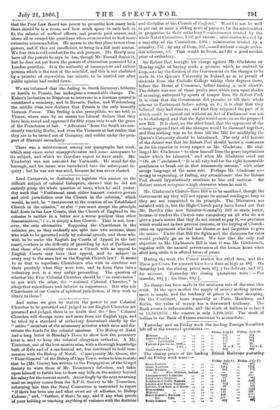Sir Robert Peel brought his charge against Mr. Gladstone on
Monday night of having made a promise which he omitted to keep,—to lay the decision of the Government on the changes to be made in the Queen's University in Ireland, so m to permit of students from the Catholic College taking their degrees there, before the House of Commons, before issuing a new charter. The debate was one of those prolix ones which turn upon shades of meaning, enlivened by spurts of temper from Sir Robert Peel. It is clear that the Government did promise to tell their whole scheme to Parliament before acting on it ; it is clear that they believed they had done so ; and that they supposed the part of it which could be carried out without an Act of Parliament was not to be challenged, and that the fight would come on on the proposed new Bill. It is clear, on the other hand, that the opponents of the scheme supposed that all the changes would be discussed together, and that nothing was to be done till the Bill for modifying, the Queen's University should be introduced. The only odd feature of the debate was that Sir Robert Peel should hector a statesman so far Lis superior in every respect as Mr. Gladstone. He chal- lenged Mr. Gladstone " to clear himself from the grave imputations under which he Laboured," and when Mr. Gladstone cried out " Oh, oh !" exclaimed, " It is all very well for the right honourable gentleman to break out in that unmannerly manner," with other savage language of the seine sort. Perhaps Mr. Gladstone woe wrong in expressing, or feeling, any astonishment that Sir Robert Peel should hypothetically attribute to him evil motives. Sir Robert cannot recognize a high character when he sees it.






























 Previous page
Previous page